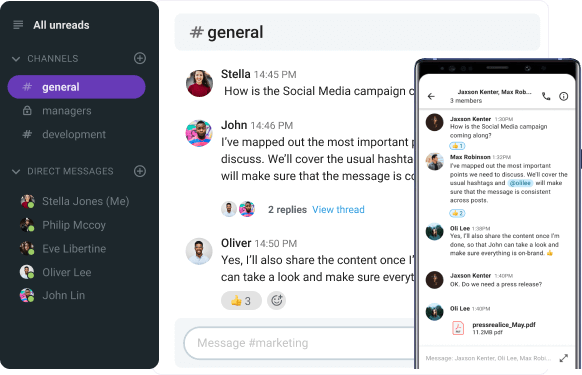If you want to thrive in the corporate world, you should know that making a great first impression will only get you so far.
Even if you hit the ground running at a new job, you’ll have to keep that momentum going if you want to get noticed.
Still, learning how to stand out at work and share that spotlight with others is guaranteed to increase your job security as well as your personal satisfaction with your work.
So, how do you get your higher-ups’ attention?
Let’s see what leaders from different industries had to say about this topic.
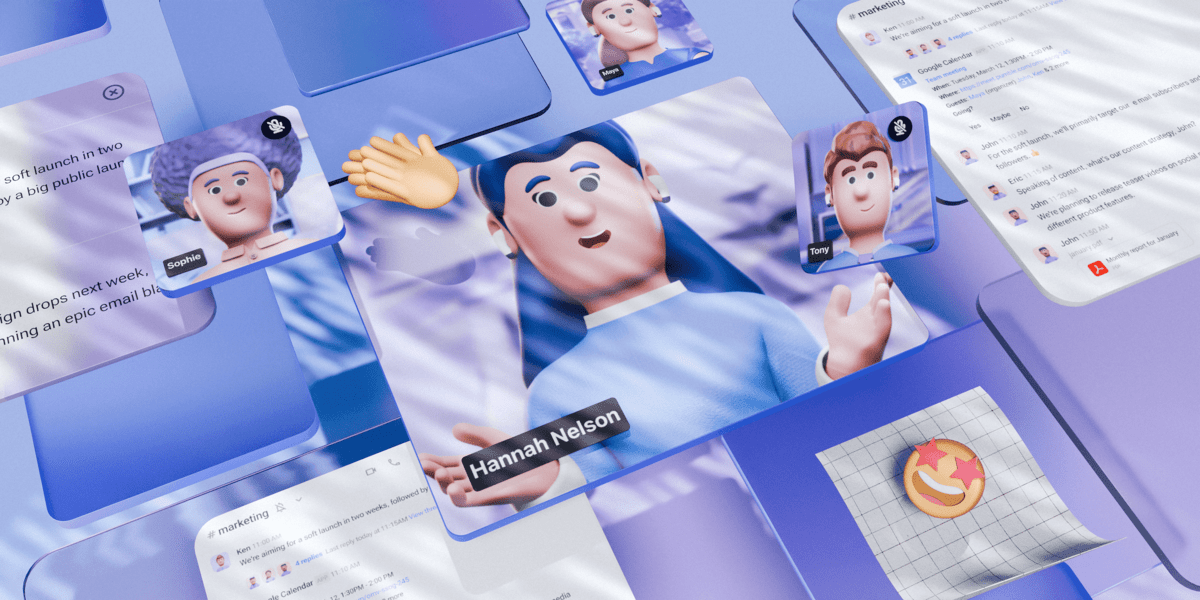
Tip #1: Improve your work performance
If you’re looking for ways to stand out at work and get promoted, you should start by focusing on doing a great job in your current role.
After all, as Kristie Ezelyk, a leader with almost 2 decades of experience in the insurance industry, told us, visibility is all about doing your job well:

“Delivering consistent high-quality work is super important for visibility. Meeting deadlines [helps you] build a solid reputation as someone who can be relied on.”
Deliverables are a crucial indicator of an employee’s professional development in industries where the results of your efforts are tangible, as a master propmaker, woodworker, and 3D modeling expert, Paul Chow, explained:

“What you deliver is key — everything else is just background noise. When it comes down to it, your output is what counts. The concrete results — the tasks you finish, the issues you fix, and the difference you make — are what matter. So, zero in on producing good outcomes, and you’ll be on track to set yourself apart from others.”
So, how can you improve your overall performance? Well, you can:
- Focus on one thing at a time and carefully check the quality of your work before submitting it,
- Limit distractions by wearing headphones, not taking on unnecessary meetings, and turning off notifications on business messaging apps like Pumble,
- Become more organized by using planners or productivity tools such as time trackers (like Clockify) and project management apps (like Plaky).
- Ask for feedback to identify areas for improvement and set realistic SMART goals.
Ultimately, exceeding expectations in your current role is a necessary first step to getting noticed at work.
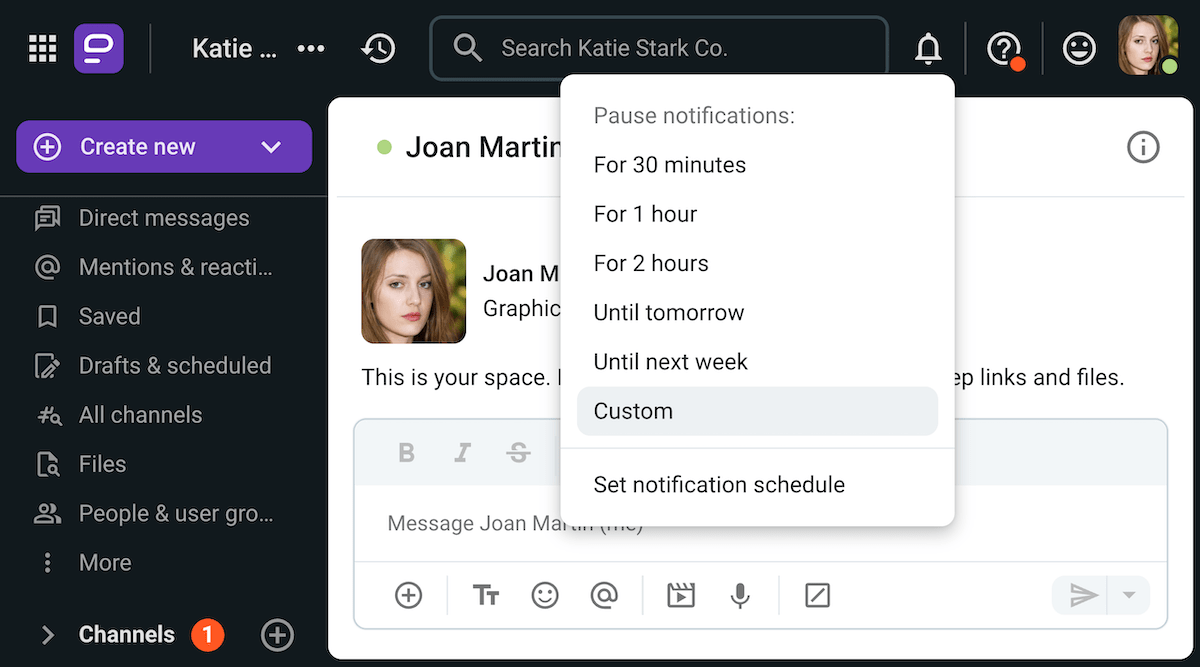
Tip #2: Be reliable
Being someone your coworkers can rely on is arguably one of the most important aspects of collaboration as a skill.
But, how can you demonstrate this skill, aside from consistently doing a great job with the tasks that are assigned to you?
According to Nicole Magelssen, the owner of a virtual executive assistance agency, one way to do so would be to do what you say you’re going to do:

“If you say you’ll do something, follow through and communicate well regarding your progress.”
Instead of taking on projects you’re not sure you can execute within the allotted time frame, you should:
- Set realistic time estimates for any tasks you take on,
- Communicate those estimates with your collaborators, and
- Follow through by delivering results on time or ahead of schedule.
But, generally, the best ways to stand out at work as a dependable employee would be to:
- Get to the office on time (or clock in on time, if you’re a remote worker),
- Have an organized workspace (which includes your desktop folders),
- Not take too many unscheduled absences, and
- Always be prepared for work.
These things may not be all it takes for you to get noticed as a valuable worker, but they’re certainly a great start.
💡 PUMBLE PRO TIP
Being a great collaborator will allow your team to experience all the benefits of a smooth collaborative process. To learn about those benefits, check out this article:
Communicate & collaborate effectively in Pumble
Tip #3: Be adaptable
If being dependable means being able to consistently deliver the same quality of work, being flexible represents the other side of that coin: the ability to adapt to changing circumstances and still do excellent work.
This kind of resilience is an incredibly desirable trait in employees, according to HR expert and the CEO of a global HR and Employer of Record platform, Lucas Botzen:

“In this rapidly moving, constantly changing world of global HR, an individual’s ability to adapt promptly to a new situation, learn from it, and apply that knowledge effectively helps them to emerge victorious.”
Conversely, people who aren’t able to adapt to changing circumstances at work tend to experience more stress as they try to cope with new conditions.
So, how can you incorporate flexibility into your approach to work?
Unfortunately, this one won’t be as easy as telling you to “always expect the unexpected.”
Instead, you can become more adaptable by:
- Being more accepting of other peoples’ ideas,
- Learning new and developing your existing professional skills,
- Being more open to receiving constructive feedback, and
- Finding strategies for dealing with stress.
Ultimately, developing this kind of flexibility will require you to give up some control at work.
If you’re someone who finds that difficult, you may benefit from shifting your focus to something outside of work.
Finding a hobby you’re passionate about could help you loosen your grip on your work-related expectations, allowing you to shift gears more quickly when faced with changing conditions.
Tip #4: Speak up
If you want to get noticed at work, you have to be willing to put yourself out there and communicate your ideas in front of other people.
Speaking up, particularly in meetings, is one of the best ways to get noticed if you’re a remote worker, as Kristie Ezelyk told us:

“Showing up on time for virtual meetings, on camera, and actively participating by sharing ideas, asking questions, and offering insights helps spotlight your engagement and expertise.”
If you’re not particularly adept at speaking in front of people you don’t know well, you can start by initiating more conversations with your closest coworkers.
Once you break the ice, being more vocal during brainstorming sessions and team meetings should get easier.
If it doesn’t, you can try following the “yes, and” principle of improvisational comedy.
In other words, if you’re ever in a meeting and you hear someone share an idea you’d like to build upon, you can validate the original idea before sharing your suggestion — “Yes (your idea is great), and (here’s how it can be even better).”
Of course, if speaking up in meetings doesn’t come naturally to you, you can always send in your suggestions after the fact, as shown in the example below.
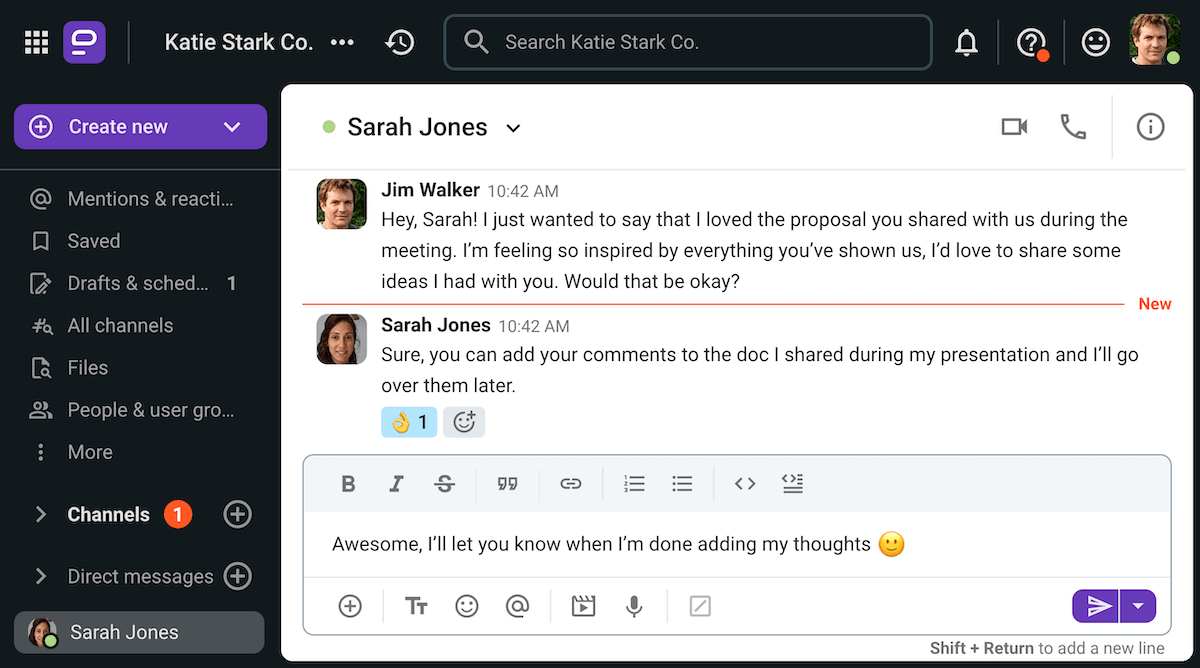
Over time, using these opportunities to speak up should allow you to better communicate your own ideas when inspiration strikes.
On top of that, being more vocal in the workplace will allow you to advocate for yourself and take the lead on group projects when the time comes.
💡 PUMBLE PRO TIP
If you find yourself struggling to communicate in professional environments, you might benefit from reading up on the different communication situations you may encounter at work.
Tip #5: Take initiative
Being proactive is a trait many employers look for when hiring new talent.
They want people who understand their jobs well enough to do them without supervision or external input, as Lucas Botzen told us:

“Rather than standing by for instructions to come from others, [employees who stand out] take charge and look ahead to predict problems before they arise, offering solutions. This kind of thoughtfulness and problem-solving attitude represents great understanding of the company’s needs and commitment to contributing positively in the workplace.”
If you’re not in the habit of taking initiative at work, you can practice it by:
- Showing interest in your field by educating yourself on emerging industry trends,
- Practicing accountability by taking steps to resolve any issues you find in your work, and
- Finding ways to be more efficient, whether it’s by using shortcuts on your computer to make your job easier or looking into ways the company can improve its processes.
According to Kristie Ezelyk, coming up with solutions to your company’s problems is a great way to show initiative:

“There are always going to be challenges in every job, on every project, and in every business. Proactively offering solutions instead of just complaining shows initiative and commitment to the success of the team.”
If you’re not sure how to identify those areas for improvement, consider:
- The goals of your organization,
- How your work fits into that overarching mission, and
- The changes you can make to get your company closer to achieving its goals.
And if you stumble across any systemic issues that should be dealt with, remember to run any solutions you come up with by the higher-ups before implementing them.
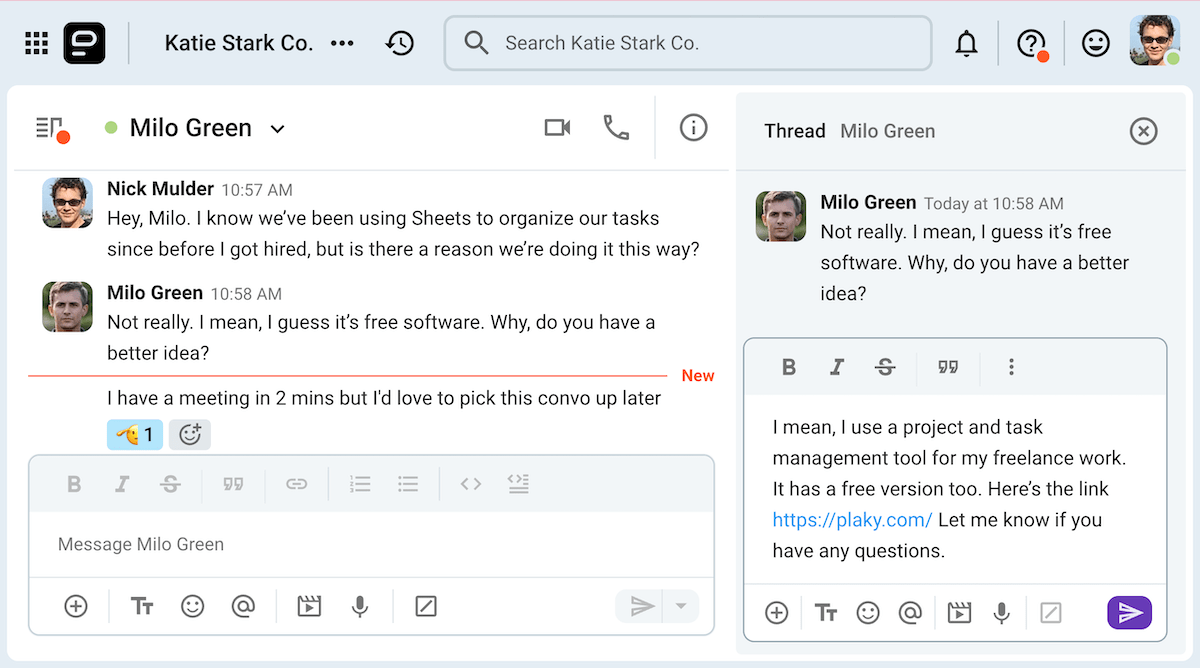
Initiate conversations effortlessly in Pumble
Tip #6: Support your company
As we have established, identifying problems in your company’s processes and coming up with viable solutions is certainly one way to support your employer.
In fact, doing so often requires great bravery as well as emotional intelligence, according to Executive Coach and Licensed Professional Counselor, Samantha Edu:

“The employees who stand out are those with the emotional intelligence to gauge whether a space is safe and the bravery to call in leadership and suggest changes to the systems that are harmful or contribute to a lack of safety. They know when to push for change and do so thoughtfully and constructively.”
However, this isn’t the only way to support your employer and position yourself as a valuable team member.
You can achieve the same results by immersing yourself in the company culture and showing support for your team, as Nicole Magelssen noted:

“Show up for your team! Participate in office activities and company-wide events. It might seem trivial, but leadership does notice.”
In other words, you should try to engage more with your coworkers and the company itself by:
- Attending company events even when they’re not mandatory,
- Engaging your coworkers and even your higher-ups in casual conversations,
- Following and interacting with the official company accounts on social media platforms, and
- Celebrating your company’s achievements, whether it’s through internal channels or external ones.
Basically, you should become the company’s biggest cheerleader.
Tip #7: Focus on your professional development
Outside of the efforts you put in to help your company reach its goals, there are other ways to stand out at work while also advancing your professional growth.
For a start, you can check if your company is offering any professional development programs or even look for free skill development training online.
If you’re not sure which skills you should focus on first, you can always ask your manager or seek out another professional mentor.
Indeed, growing your professional network and building better relationships with your business contacts can only help on your journey of professional development.
In any case, if you set measurable goals and track your progress, you’re bound to see an improvement in your overall performance at work, and that, in itself, should be enough to attract the attention of your higher-ups.
After all, as Kristie Ezelyk told us, learning new skills is a great way to show your commitment to the success of the company:

“Taking initiative to learn new things further shows your commitment to the betterment of the team and the overall success of the business.”
Tip #8: Be a team player
Doing a good job in your role is a great way to build trust in your team, as Lucas Botzen told us:

“When you know you can rely on a person delivering quality work on time, that builds trust and, simultaneously, strengthens the bonds within the group. A consistently positive attitude and the teamwork approach often elevate such a person into influential team membership.”
However, if you want to get positive attention at work, you’ll need to include your coworkers in your efforts.
With that in mind, you should focus some of your energy toward becoming a better coworker by:
- Practicing empathetic communication,
- Offering to help your coworkers with their projects if you see them struggling,
- Being open-minded when considering other people’s ideas,
- Sharing information and resources, and, generally
- Becoming a more pleasant person to work with.
If you work in a remote team, building strong relationships with your team members will be particularly important, as Kristie Ezelyk noted:

“Reaching out to colleagues to collaborate on projects and share resources, or being a go-to person can help enhance your reputation. Taking time to connect with your team and leadership through virtual chats or informal check-ins can help as well. Business is about building relationships, and you have to be even more intentional about it when you are working remotely.”
💡 PUMBLE PRO TIP
Learning more about group dynamics should help you become a better team player. Check out these articles to learn more:
Tip #9: Become a mentor
One of the goals of ongoing professional development is to become someone others can turn to in their hour of need, as Nicole Magelssen noted:

“Having a niche skill or area of expertise can make you stand out. Become the go-to person for a specific software, platform, or talent in your company.”
Being generous with your time and willing to teach your skills to others can easily make you indispensable as an employee.
However, not everyone has what it takes to be a mentor.
If you’re looking for tips in that department, try basing your approach on the principles of coaching leadership by:
- Offering individualized guidance,
- Discovering your leadership communication style,
- Emphasizing the importance of individual professional development, and
- Empowering your team members to take charge of their professional growth.
If you want to take this a step further, you can have a hand in creating an official mentorship program at your company, which would connect notable employees with those who’d like to take a similar career path.
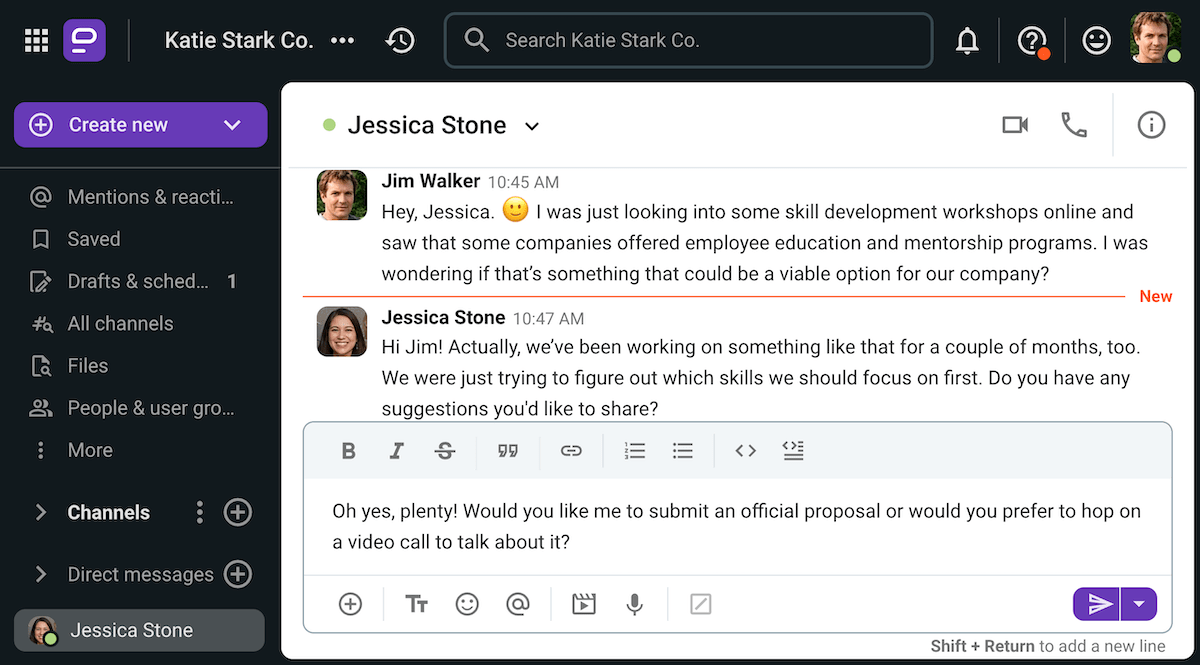
Tip #10: Manage your stress levels
In the process of learning how to stand out at work, you should pay close attention to your mental health.
Overly ambitious individuals tend to forget the limits of their capabilities and ignore their health until they’ve passed the point of no return.
However, having to take an extended leave of absence to deal with the consequences of burnout won’t get you the kind of attention you’re looking for.
So, be sure to prioritize your work-life boundaries by:
- Understanding your limits (for example, if you notice that you tend to feel drained around 4 p.m., try to do most of your work earlier in the day),
- Not overpromising (e.g. if you know it’ll take you 5 days to get a task done, don’t say that you can do it in 2 days),
- Not working or responding to work-related messages after you clock out, and
- Focusing on your personal life outside of work.
In other words, only take on as much work as you believe you can handle without overworking yourself.
Ultimately, keeping your stress levels in check won’t just benefit you.
Doing so will also allow you to emotionally regulate yourself at work, which will be a plus to everyone you work with, as Samantha Edu told us:

“Those who excel are also the ones who:
- Prioritize their health and wellness,
- Practice self-care, and
- Have strong emotional regulation.
They lead with empathy and resilience, which not only helps them thrive but also positions them as effective leaders.”
💡 PUMBLE PRO TIP
If you want to learn more about leading with empathy, check out our breakdown of empathetic leadership:
Tip #11: Avoid workplace drama
Being involved in office drama is sure to make you stand out at work — in all the wrong ways.
With that in mind, it’s best to steer clear of any toxic workplace behaviors and the people who engage in them.
Avoid complaining about work, your coworkers, and your higher-ups — especially when you’re at the office. You should also try not to gossip, if you can help it.
Basically, if you have a problem with someone, you should rely on your emotional intelligence to resolve it, as Lucas Botzen advises:

“[Knowing how to utilize] emotional intelligence at work is a big plus. Being empathetic and able to negotiate interpersonal relationships with tact and discretion often provides one with main inputs to maintain a good work atmosphere. They are proficient in their roles and also add value to the entire team through a mutual respect approach and team-oriented skills.”
Alternatively, if you see other people engaged in conflict and you’d like to practice your mediation skills, you could step in or report the behavior (if it’s serious enough).
💡 PUMBLE PRO TIP
Not sure how to go about resolving conflicts on your team? Check out the following guides:
Use Pumble to communicate your way through workplace conflict
Tip #12: Behave professionally
As workplace culture becomes more relaxed, behaving according to professional etiquette may become another way to distinguish yourself.
Of course, that’s not to say that you should be a stick-in-the-mud and go around using honorifics for your coworkers if that’s not what everyone else is doing.
Rather, behaving professionally should be more about:
- Appearing presentable in the office or in virtual meetings,
- Practicing respectful communication with your coworkers,
- Being courteous to your coworkers and higher-ups alike, and generally
- Adhering to your values even in a professional setting.
Ultimately, behaving professionally at work will never be the wrong choice.
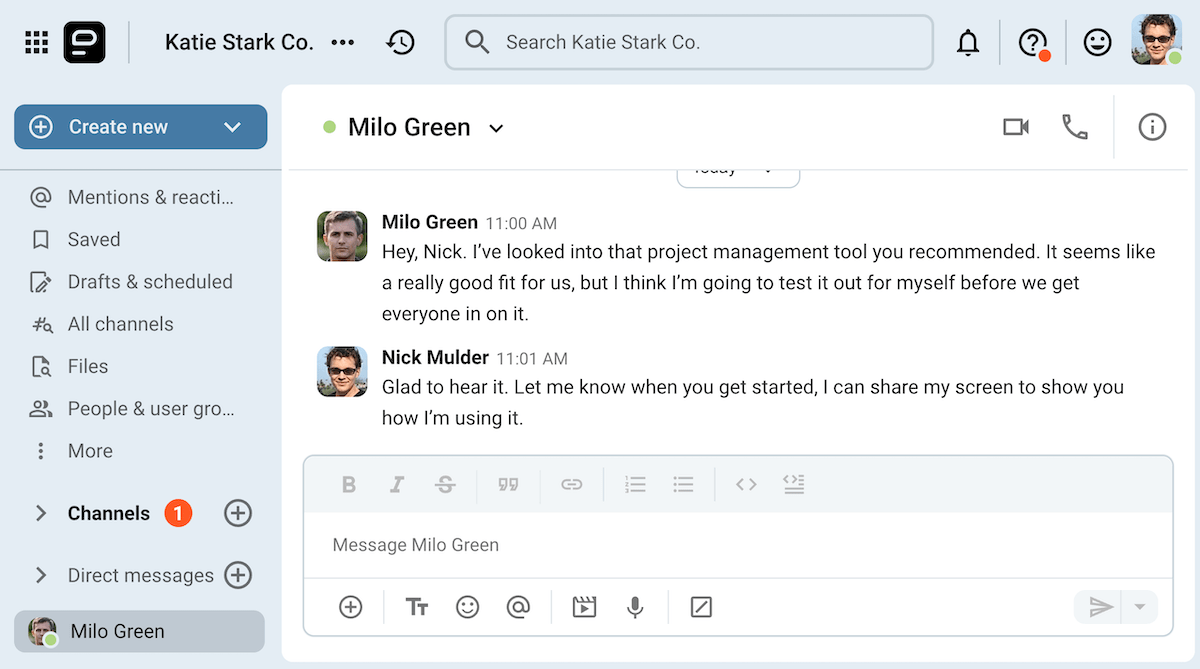
Tip #13: Have a positive attitude
Maintaining a positive attitude at work is, obviously, easier said than done.
Still, if you’re able to do it, your optimistic outlook could contribute to a more positive work environment, as Kristie Ezelyk told us:

“Maintaining a positive attitude during challenging times can be infectious to the rest of the team and create an overall positive culture.”
Furthermore, according to Samantha Edu, bringing a positive attitude to a remote work environment is a surefire way to boost employee morale:

“In a remote environment, I’ve noticed that standout employees don’t just do their job; they actively look for ways to uplift the entire team. They ask thoughtful questions, share valuable insights, and show up for others in meaningful ways.
Staying engaged, keeping communication channels open, and finding creative ways to connect with colleagues — even from miles away — truly sets them apart from others.”
So, how do you train yourself to maintain a positive mindset at work?
Well, some of the workplace success tips we’ve already shared should help with this.
For example, building closer relationships with your coworkers could help you enjoy your time at work more, and thus have a more positive outlook.
On top of that, not letting yourself speak negatively about coworkers or work in general should also have the effect of forcing you to look at things in a more positive light.
Lastly, setting firm boundaries should result in a healthier approach to work, which might positively affect your overall attitude.
Aside from these things, you can also try practicing gratitude. Making a habit of pointing out the things you’re grateful for should help you develop a more positive outlook.
💡 PUMBLE PRO TIP
Kill two birds with one stone! Connect with your coworkers while practicing gratitude by saying those 2 magic words:
Practice positive workplace communication on Pumble
Tip #14: Stay informed
Believe it or not, being aware of the news cycle can really help you position yourself as a valuable team member.
Just think about it.
Tracking industry trends is difficult work — some things are bound to slip through the cracks.
With that in mind, letting your higher-ups know about emerging trends you’ve noticed may help eliminate those oversights.
On top of that, staying up to date with pop culture in a more general sense could also benefit your company.
Even if you’re doing nothing but scrolling through social media, you may come across trends that could inspire your company’s next product or, at the very least, its next marketing strategy.
Tip #15: Work on your communication skills
As we have learned, there are countless ways to stand out at work.
However, no matter which route you choose to take on your journey of professional development, communication will always play a vital role in your success.
As Kristie Ezelyk sees it, the importance of effective communication can’t be overstated:

“Clear communication is necessary for any team, project, or business to be successful. If you don’t have excellent communication skills, you will get nowhere.”
And, once again, this skill set is especially important for remote workers:

“Using the tools available to stay connected and keep your team informed about your projects through video calls, instant messaging, and email needs to be done often and intentionally.”
So, how do you sharpen your communication skills?
Well, you can do so by:
- Practicing active listening by hearing people out without judgment and without interjection,
- Paying attention to nonverbal cues when communicating in person or on video calls,
- Getting comfortable with speaking in front of people, particularly higher-ups,
- Striving for clarity and honesty in your communication, and
- Being responsive and emotive even when using a messenger to communicate.
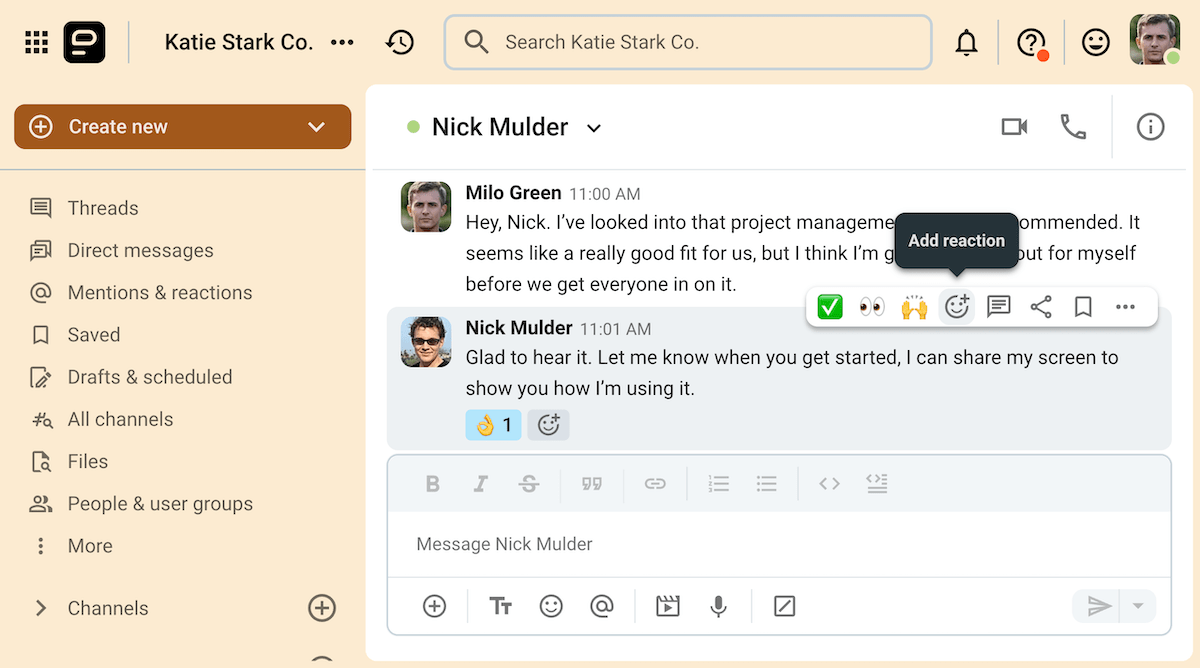
Use Pumble to get noticed at work
Learning how to stand out at work is sure to benefit your career no matter which way you choose to go about it.
However, at this point, we should acknowledge that people who mostly communicate with their coworkers through team messaging apps may have a more difficult time getting noticed.
Luckily, Pumble makes applying the tips we’ve shared easy even if you’re a remote employee.
For example, in addition to silencing notifications to improve your work performance, Pumble also lets you set customized statuses to explain why you’re not responding to messages, as shown in the image below.
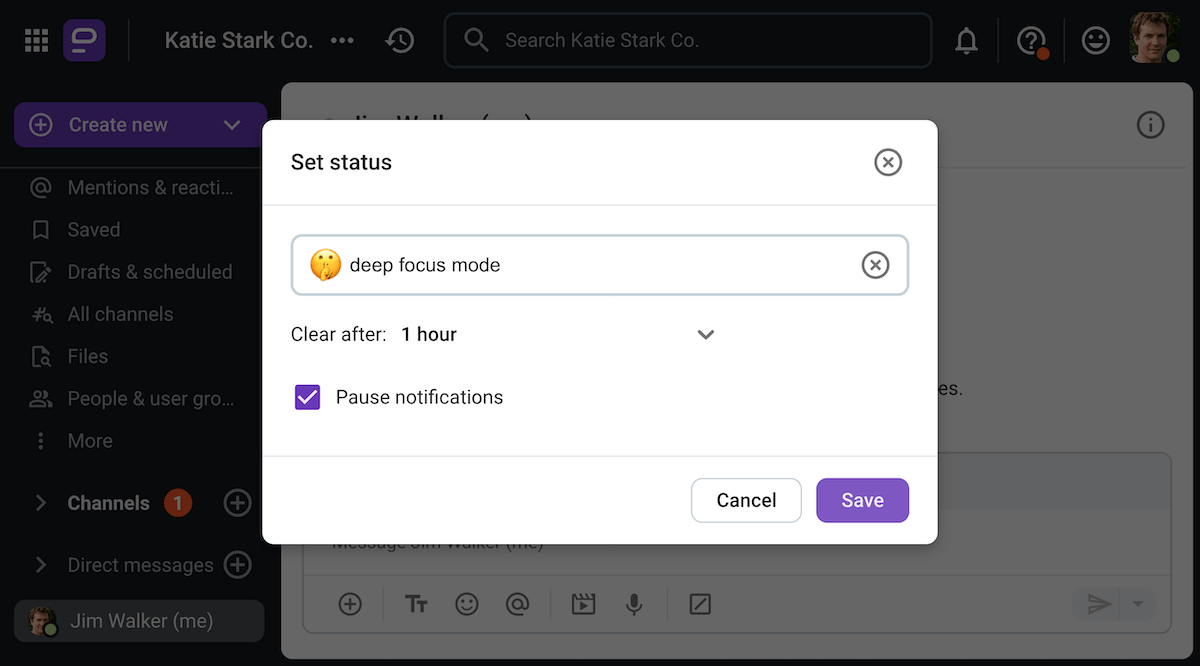
On top of that, Pumble’s video conferencing feature will help you speak up at meetings. It’s as easy as raising your hand.
Depending on the permissions set for your Pumble workspace, you may also get to take initiative and participate in building the company culture by creating new channels you and your coworkers can use to have both work-related and casual conversations.
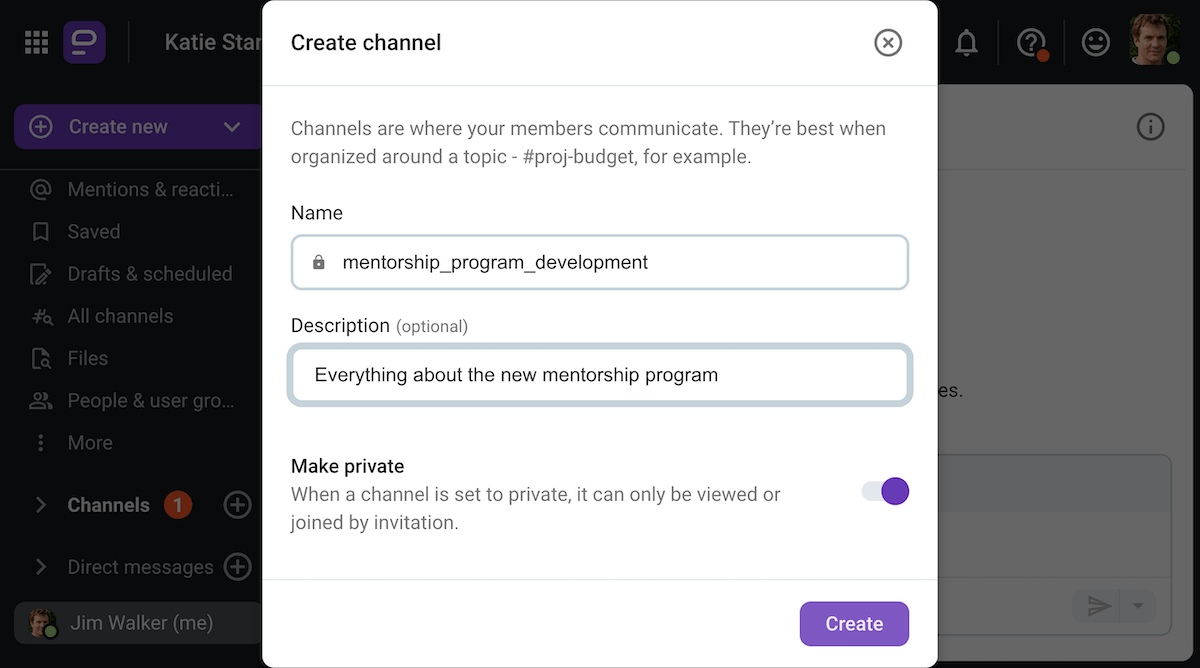
So, if you’d like to have a hand in making your company a more connected workplace, introduce Pumble to your higher-ups.
After all, helping your organization discover more effective but still reasonably priced collaboration tools will go a long way towards cementing your position as a company influencer.
Step into the spotlight and become noticeable!





